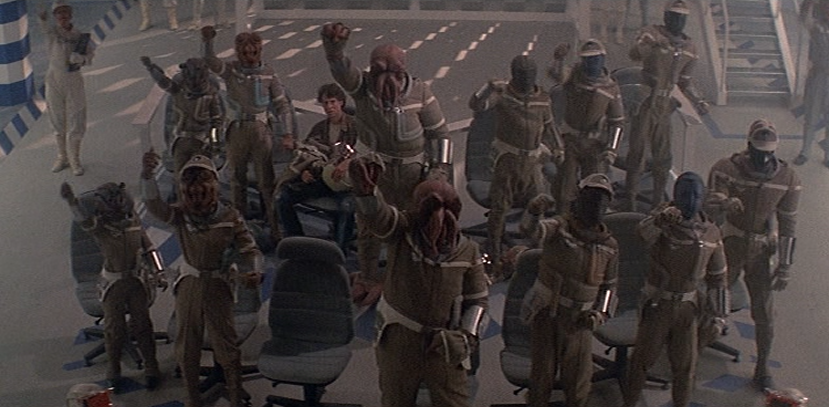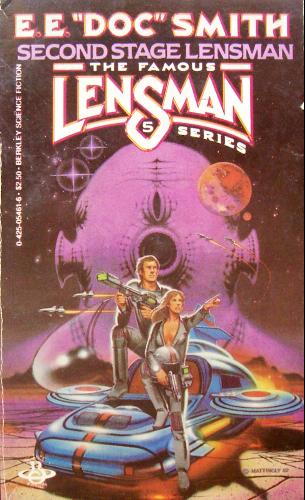SUPERVERSIVE: A Superversive Theory of Violence
Tuesday , 27, September 2016 Superversive 11 Comments I’ve been trying to show my niece one of my favorite childhood films for some time now; probably a year or two. But I guess kids are pretty opinionated, want to watch what they know, and are sometimes a little obnoxious when they’re not being endearing. It was a war. She wanted to watch Star Wars again. Or Doctor Who. Eventually, though, adulthood prevailed and we watched The Last Starfighter this spring. The response from both her and my (muggle) wife was a little… underwhelming. Fast forward a couple months, and I’m pushing my niece on the swing at my parents and she shouts “Victory or Death!” and runs off after some unknowable target.
I’ve been trying to show my niece one of my favorite childhood films for some time now; probably a year or two. But I guess kids are pretty opinionated, want to watch what they know, and are sometimes a little obnoxious when they’re not being endearing. It was a war. She wanted to watch Star Wars again. Or Doctor Who. Eventually, though, adulthood prevailed and we watched The Last Starfighter this spring. The response from both her and my (muggle) wife was a little… underwhelming. Fast forward a couple months, and I’m pushing my niece on the swing at my parents and she shouts “Victory or Death!” and runs off after some unknowable target.
I guess I’ll chock that up as a victory for me. Score one for the nerdy uncle.
The wife and I are expecting our first kid this spring. Pregnancy’s been a little dramatic, but this are currently progressing well, and I’m experiencing just how much of a perspective change comes from being responsible for a helpless human being. Conversations about the environment we want for our child, and about how we’re going to have to clean up our language. (Apparently, “butt” is a foul word to kindergarten teachers.) Whether Santa Claus is an integral part of childhood or whether the big reveal will scar the child for life. One thing that I am absolutely certain of, though, is that I want my child to shove his (or her) little fist in the air and shot “Victory or Death!” before running off after some unknown goal. (“By Klono’s Adamantium Guts!” will also suffice.)You know, as a kid, I remember a lot of sword fighting in school. Boys (including me) went through a lot of wooden twelve-inch rulers because we’d stab each other with them. We’d break them in contests of strength. Mom would complain; dad would dutifully buy me a new ruler. “They’re boys,” he told her. “They have to test themselves.” We played Army Dodgeball– in school, no less– in which you’d lose limbs if they got hit with the ball. The world was a different place, I guess. I don’t remember nearly as many problem students as my wife has now. I don’t remember children as fragile as they are now. I don’t remember people being as fragile as they are now. We’ve tried to make things safer since the 80s and instead it seems like we’ve just made everything more breakable.
 We focus a lot on heroism and a sense of wonder when we talk about superversive stories. Those things are important, but I really have to wonder if a willingness to fight to protect innocents isn’t something that is more or less a necessary component of superversion. Not all stories are going to require violence, obviously, but I’m trying really hard to think of a story involving an absolute pacifist that I’d be willing to call superversive. (Trigun, I suppose, but I’ll note that Vash is still plenty willing to shoot folks. He just doesn’t kill.) I think we’re missing the ball by not having a superversive theory of violence.
We focus a lot on heroism and a sense of wonder when we talk about superversive stories. Those things are important, but I really have to wonder if a willingness to fight to protect innocents isn’t something that is more or less a necessary component of superversion. Not all stories are going to require violence, obviously, but I’m trying really hard to think of a story involving an absolute pacifist that I’d be willing to call superversive. (Trigun, I suppose, but I’ll note that Vash is still plenty willing to shoot folks. He just doesn’t kill.) I think we’re missing the ball by not having a superversive theory of violence.
Fans of action movies or Hong Kong cinema might be familiar with a genre called “Heroic Bloodshed,” largely dominated by the early works of John Woo. A couple of years ago, before the giant conglomeration of all the Breitbart sites, Big Hollywood ran an article series called “For Conservative Movie Lovers.” The early articles dealt with Woo and his films in some depth, including the interesting fact that Woo is a devout Christian whose over the top action movies reflect his Christian faith.
Hard Boiled has more death and destruction in it than any number of American action films, but strangely enough it manages to remain far more morally defensible and intriguing. The issues it raises aren’t just cheap plot points — Woo’s unflinching depiction of the eternal battle between good and evil gives his spiritual themes real teeth. For example, Hard Boiled sports a triad godfather who can’t bring himself to keep up with the demented younger generation of crooks, most of whom long ago abandoned the old code of mafia ethics he grew up with — and he pays for his conscience with his life.
Woo allows another likable villain — the crowd favorite, no less, the cool-as-hell Boba Fett of the movie — to come to an abrupt end at the hands of his merciless boss after refusing to gun down a crowd of innocents. [Read more.]
There’s a misquote-slash-summary-of-a-passage of GK Chesterton’s to the effect of “Fairy tales are important, not because they tell us dragons exist, but because they tell us dragons can be beaten.” I think this is absolutely important for the superversive story; if we’re about painting a world with heroism, we should be aware that that same heroism will likely require violence at some point.
I wonder how much of our fragility comes from the way we’ve stripped violence out of our children’s stories. I grew up in the 80s, on an Air Force Base, watching The Wrath of Khan, The Last Starfighter, GI Joe, and Transformers. Star Wars. Lots of things with explosions. Lots of things with violence. Lots of heroes setting their jaw and fighting and sacrificing to defeat evil. Heck, even reality– it was the tail end of the Cold War and, sure, perestroika was a thing. But we still had enemies, and I knew my dad– a USAF sergeant who worked on the airframes of F-15s– worked to keep us safe from them. (Even if he didn’t fight, he made it possible for others to fight.)
And what could be more superversive than that?
Josh Young is a seminary student, Castalia House author (featured in God, Robot and author of the forthcoming Do Buddhas Dream of Enlightened Sheep) and blogger at Superversivesf.com If you enjoyed this, we’d love to have you visit our main site!
For what it’s worth:
1) We drew the line at “crap” and “frack.” Kids will engage in hilarious and inappropriate mimic behavior, though. So you reap what you sow. Today, my 6.5yo: “Dad?! Why did you say ‘shit?’ What’s ‘shit’? Did something take a . . . ” “Just stop, kiddo. Daddy will be good.”
2) Both my girls (6.5 and 2) run around the house with foam axes and swords. I’ve made my eldest two complete sets of more-or-less historically accurate cardboard armor. So “test to death” is learned behavior, and have at it.
3) Fight for innocents? Protection? Heh. “I’m going to take my lightsaber and kill the bad guys!” (6yo) “Well,” says I, “Will you kill the bad guys, or capture them?” “I’m a Jedi. I’m going to kill them.” She’s not wrong.
Also, Firefly.
Zoë: Preacher, don’t the Bible have some pretty specific things to say about killin’?
Book: Quite specific. It is, however, somewhat fuzzier on the subject of kneecaps.
Mentioning television. I just binged watched HBO’s True Detective season 1 this weekend. It was one of the darkest shows I have ever watched yet when you look at it philosophically it’s a pure good vs evil story that ends on a good note and also redeems its main characters.
Great post, Josh. Quite interesting tidbit there that John Woo is a big Christian.
You’re right on about this stuff. Soft times make soft people. The pendulum is going to swing, and those people looking for their safe spaces are going to be in trouble.
The Killer is probably the best example of what you’re talking about. Intensely violent movie with a very moral message that works with the content. The scene in the office where a certain character tries to get something back for his friend is probably one of the best violent scenes I’ve ever seen in a film.
If you want to use Trigun, you could always bring up Wolfwood. He was Vash’s opposite in many ways which led to some of the best moments in the show. Wolfwood, in turn, is what leads Vash to the ending of the series.
Great post. As someone who likes some surprisingly violent stuff, I entirely agree.
I would think that a doctrine of violence would be a direct result of one’s doctrine of inherent rights. Legitimate violence is that which is done to defend a legitimate right. Thus a statist, who believes that individuals do not have rights save those granted by the state, would say that for an individual all use of force is illegitimate. Violence, they would say, is the sole prerogative of the state.
If one has a doctrine of individual rights then one must have a doctrine of individual violence–violence used by an individual is legitimate to protect individual rights (either one’s own or those of another individual) against any force that seeks to violate them.
(“By Klono’s Adamantium Guts!” will also suffice.)
Blinding blue blazes! Adamantium guts? It’s got to be gadolinium (Doc Smith used this), or germanium or something – non-alliterative body parts for Klono are the rankest heresy…